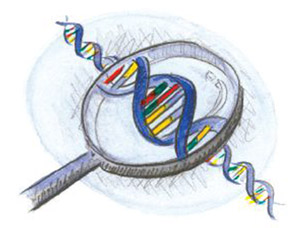Screening for Lynch Syndrome Genetic Mutations

Lynch syndrome is a hereditary disorder caused by germline mutations in the DNA mismatch repair (MMR) genes MLH1, MSH2, MSH6 and PMS2. Normally, MMR genes repair DNA damage generated during DNA replication. When these genes are mutated, they may fail to repair replicated DNA damage. This could lead to an accumulation of damaged DNA and the development of abnormal growths such as cancer.
Research has shown that carriers of MMR gene mutations have an increased risk of developing colorectum, endometrium, ovarian, kidney, pancreas, stomach, bladder and breast cancers. In recent years, scientists have begun investigating the associations between MMR gene mutations and prostate cancer. Dr. Catalona’s research group published among the earliest studies linking Lynch syndrome to prostate cancer in 2007. Their study found that tissue staining for the MLH1 protein is a marker for prostate cancer.1
A recent study from Australia investigated the prostate cancers from 32 men who carried MMR gene mutations.2 The mutation carriers had a 3.2-fold increased risk of prostate cancer. For men with the MSH2 mutation, the risk was 5.8-fold higher. Prostate cancer was the first or only diagnosed tumor in 37% of the carriers.
The authors wrote that testing for MMR mutations in men diagnosed with prostate cancer could help identify carriers whose family members should be screened for prostate cancer.
- Chuang S-T., et al. Mutant L Homologue 1 (MLH1): a possible new immunohistochemical marker for prostatic cancer. Histopathology. 2007. DOI: 10.1111/j.1365-2559.2007.02879.x
- Rosty C., et al. High prevalence of mismatch repair deficiency in prostate cancers diagnosed in mismatch repair gene mutation carriers from the colon cancer family registry. Familial Cancer. 2014; 13:573-582.







